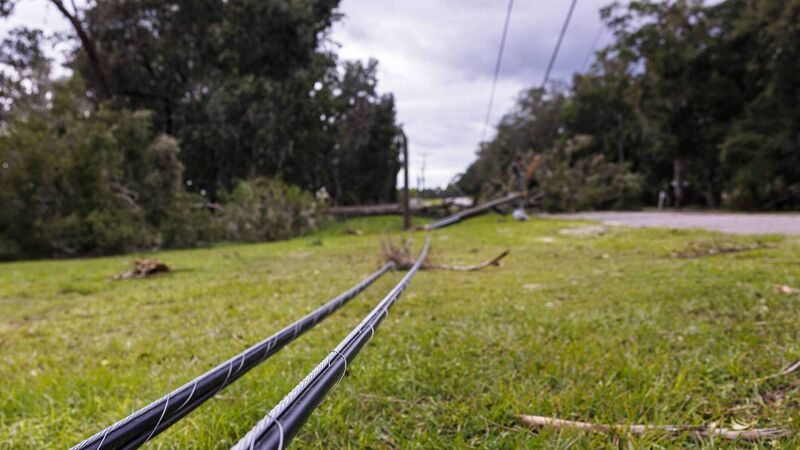New emergency framework aims to strengthen Ireland’s storm preparedness

In January, Storm Éowyn left 768,000 premises without power, more than 200,000 without water, more than one million telecom customers without broadband or phone coverage and widespread agricultural damage. File picture
A new framework for enhanced co-operation between industry, Government and ComReg is being established to prepare and respond to future weather emergencies, including storms.
The Climate Change Advisory Council said earlier this year that Ireland must be much better prepared for the next major weather event and respond rapidly.
It noted the fingerprints of climate change were increasingly evident in the intensifying magnitude and frequency of certain extreme events, particularly heavy rainfall and heatwaves.
Storm Éowyn in January of this year set a record, with sustained hurricane-force winds of 142km per hour.
It left 768,000 premises without power, more than 200,000 without water, more than one million telecom customers without broadband or phone coverage, and widespread agricultural damage.
Along with Storm Darragh, an estimated 23,652 hectares of trees were flattened, and many rural communities were isolated for periods.
As the winter weather sets in countrywide, TDs Brendan Smith and Louis O’Hara sought progress reports from Government ministers on plans to cope with further likely weather events.
Communications minister Patrick O’Donovan said the new emergency preparedness and response framework was being established by his department.
It is to ensure the lessons learned in the aftermath of Storm Éowyn are put into effect and any issues identified can be worked on.
“The framework will ensure the telecommunications sector is able to respond to emergencies in a more agile manner by allowing for better coordination between private network operators and the State,” he said.
Mr O’Donovan said the networks provided a key infrastructure underpinning the State’s modern digital society and economy.
As such, reducing the impact of service outages owing to the impacts of extreme weather events was a key area of focus for the department.
He said he had significant engagement with both mobile and fixed network operators to understand the issues that led to network service outages during Storm Éowyn.
Officials have been working with the sector to support improvements in its ability to cope with severe weather impacts.
Working with industry and the independent regulator, ComReg, he said a list of key mobile network sites was being developed for prioritisation of both preparatory and response resources.
“Clearer communication between all stakeholders, including the public, is required, and I expect to see an enhanced system of information gathering and sharing in place this winter,” he said.
TD Michael Moynihan asked if action was being taken to reduce power outages across the country caused by fallen trees and the steps being taken regarding power lines passing through forestry.
Energy minister Darragh O’Brien said he had asked ESB Networks to prepare a plan to enhance the resilience of the grid in the most vulnerable locations for the winter, which was published in April.
ESB Networks reported to the department it undertook a survey of the electricity network following Storm Éowyn, making hazards safe and identifying remedial works needed to refurbish the network weakened by the recent storms.
It continues to work with Coillte and the Department of Agriculture to identify segments of the network at the highest future risk. Analysis of customers most affected by windfall has identified priority areas for remediation.
Timber harvesters had been procured and, during the summer, began to cut timber according to this prioritisation.
Emergency stocks of spare parts and materials are to be replenished and doubled in size by October. This replenishment is on schedule for completion and is now 80% complete
Mr O’Brien said his department was preparing legislation to enhance ESB Network’s powers to manage vegetation, place the dimensions and conditions of corridors through forestry on a statutory footing, and establish principles for the compensation of affected landowners.
The Cabinet approved the heads of this bill on July 29, he said, adding work on advancing the legislation continues.










